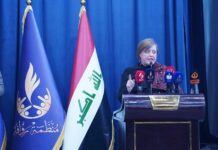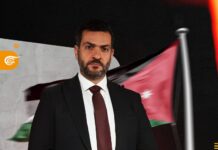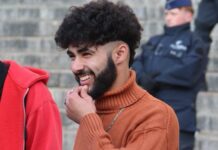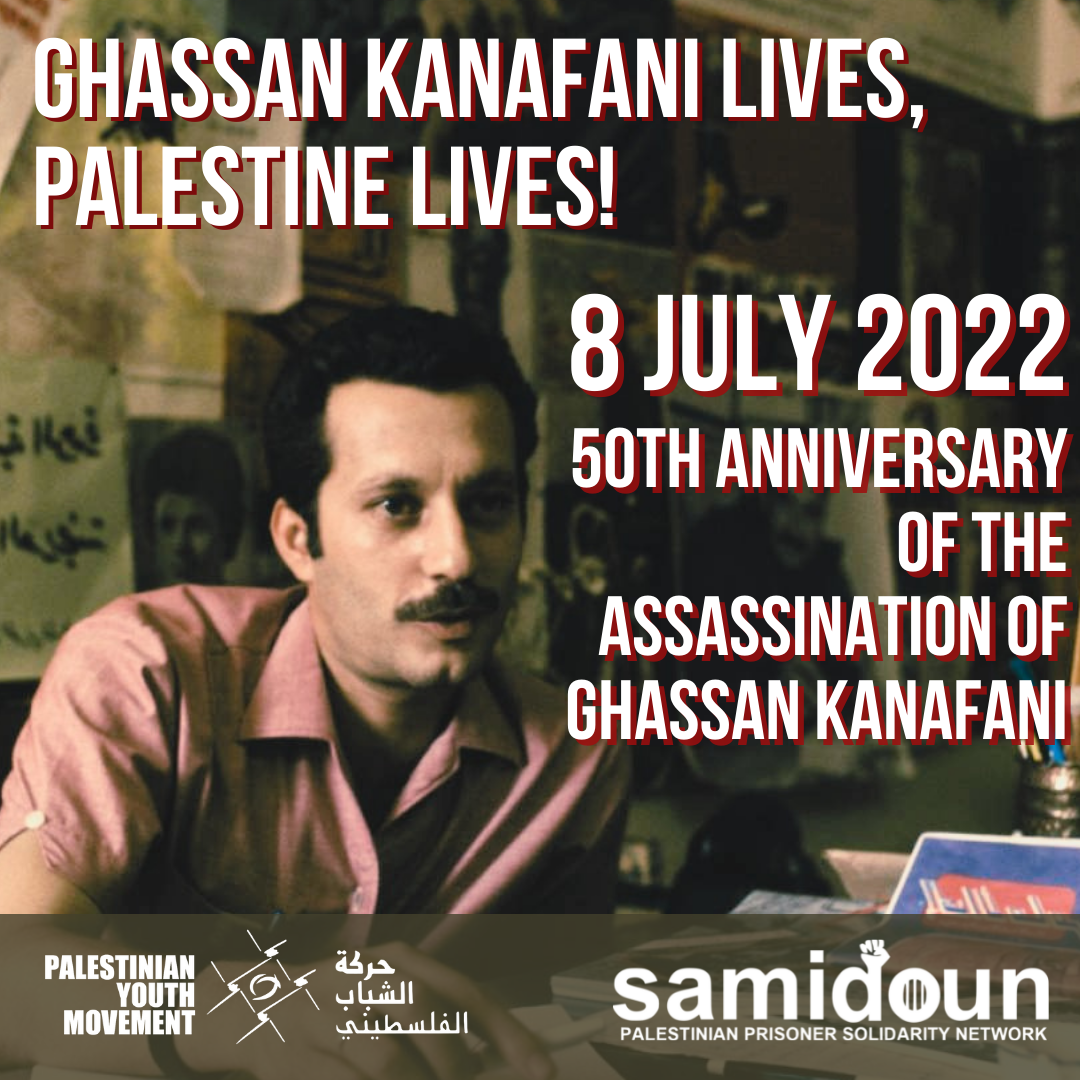
“The Palestinian cause is not a cause for Palestinians only, but a cause for every revolutionary, wherever he is, as a cause of the exploited and oppressed masses in our era.” – Ghassan Kanafani
A statement from Samidoun Palestinian Prisoner Solidarity Network and the Palestinian Youth Movement
8 July 2022 will mark the 50th anniversary of the assassination of Ghassan Kanafani, a political and cultural icon of the Palestinian resistance and the Palestinian people. On 8 July 1972, Kanafani, the Palestinian revolutionary writer, was assassinated by a car bomb placed by the Mossad outside his home in Beirut, together with his niece, Lamees Najm. We urge all Palestinians, Arabs and internationalist supporters of the Palestinian cause to commemorate this anniversary by making it a day of cultural and political struggle and resistance for Palestine in cities and communities around the world. By holding actions and demonstrations in cities all over the world, and channeling our revolutionary imaginations towards liberation-focused lines of verse and imagery of righteous resistance, we collectively affirm that the legacy of Kanafani is alive and well, and that our people will never give up the struggle until total liberation and return.
We urge all groups, organizations and communities working on Palestine to mark this important anniversary that highlights the immortality of Palestinian resistance and creativity, despite the deliberate policy of targeting and assassination used by the colonizer against Palestinian leaders, freedom fighters and visionaries. This policy of targeting and assassination continues to the present day; on May 11, beloved Palestinian journalist Shireen Abu Aqleh was shot dead by occupation forces as she covered their invasion into Jenin. From the assassination of Kanafani to that of Shireen Abu Aqleh, Palestinian voices of truth and resistance will not be silenced.
This anniversary is a time to celebrate Palestinian revolutionary and resistance arts inside and outside Palestine, highlight the struggles of the prisoners’ movement inside Zionist and imperialist prisons and organize for international solidarity with the Palestinian cause, for liberation and return to Palestine, from the river to the sea. It is a time to revel in the inherent interconnection between uprisings for anti-colonial liberation and the creative spirit, which Kanafani seamlessly embodied throughout his life and thought. To fight for freedom, to refuse to succumb to the subjugation of Zionist settler-colonialism is a deeply creative process, requiring the negation and dismantlement of the extant, oppressive order, and the bold lucidity to imagine what awaits us after.
In particular, we urge Palestinian youth to take inspiration from Kanafani’s multifaceted and brilliant legacy of struggle, in developing their role in renewing Palestinian revolutionary culture and leading the Palestinian struggle forward toward the achievement of liberation. Kanafani understood that culture is not supplementary to political efforts, but is in fact its own radical terrain of political struggle. We also note the deep collective and internationalist revolutionary tradition of Kanafani’s vision and political work; this anniversary is a Palestinian, Arab and international date not of mourning, but of building collectively upon the legacy created by Kanafani and his comrades.
Kanafani’s revolutionary life in struggle
Ghassan Kanafani was born in Akka, Palestine, on 9 April 1936. Forcibly exiled from Palestine with his family in the Nakba of 1948, first to Lebanon and then to Syria, he studied at Damascus University before being dismissed for political reasons. He then worked as a teacher in Kuwait before returning to Beirut to pursue journalism, cultural work and political work as part of the Arab Nationalist Movement, the pan-Arab revolutionary, socialist and anti-imperialist movement founded by Dr. George Habash. Along with Habash and other comrades, he was a co-founder of the Popular Front for the Liberation of Palestine, and became the editor of Al-Hadaf magazine and an international spokesperson for the Front. In addition to his political leadership and representation, he designed and drew many of the Front’s early political posters. As a revolutionary Marxist-Leninist, he was greatly inspired by Arab, African and Asian liberation movements, and played a major role in the development of the “Strategy for the Liberation of Palestine.”
At the same time that Kanafani worked tirelessly to develop and represent a clear, revolutionary politics for the liberation of Palestine from Zionism, imperialism and reaction, he simultaneously expressed the creativity of Palestinian revolutionary culture. Kanafani also worked to collectivize the Palestinian narrative, shifting the national literary and cultural ethos away from discrepant experiences of disposession towards a unified, nationalist literary evocation of colonial oppression and radical resistance. His simple, evocative language and style expressed the reality of the Palestinian people, spoke of the pains of diaspora, and illustrated sacrifice made in the pursuit of home and liberation, to Palestinians themselves and to the world; his works have been translated into over 20 languages. His works were innovative in both style and substance, highlighting the experiences of the Palestinian working and popular classes. “Men in the Sun,” “Return to Haifa,” “Um Saad,” “All That Remains to You” and his many short stories and plays remain immortal works of literature with captivating power today.
In addition to his creative writing, his novels, stories and plays, he also engaged in comprehensive political and literary studies. Indeed, he was the first to use the term “resistance literature” to describe Palestinian writing, even as he produced many of the foundational examples of such literature.
Kanafani met and married Anni Høver, a Danish educator and advocate for children’s rights, in 1961. They had two children, Fayez and Laila, and after Ghassan’s assassination, Anni created the Ghassan Kanafani Children’s Foundation, which continues to provide education and resources for Palestinian refugee children in the camps in Lebanon, who, like Ghassan, continue to be denied their right to return to Palestine.
They Cannot Assassinate Resistance
The assassination of Kanafani on 8 July 1972 exemplified the Zionist assassination policy targeting Palestinian leaders, writers, diplomats and revolutionaries. It was a failed attempt to kill the resistance by killing the creative writer and revolutionary leader who represented the struggle through his words and his ideas, who reflected the people’s liberation struggle from colonialism and served as the voice of the fedayee in armed struggle, despite never carrying a weapon himself. This has been a systemic policy of attempting to liquidate the Palestinian people’s struggle by targeting its leaders and visionaries; despite the bloody price that this criminal policy has extracted, it has remained a failure. Ghassan Kanafani’s words, ideas, analysis and legacy are more relevant than ever before, 50 years since he was stolen from us at the age of 36.
Ghassan Kanafani was a committed internationalist, developing relationships between the Palestinian revolutionary movement and the PFLP with revolutionary movements and organizations around the world. He viewed the struggle against imperialism, including within the imperialist countries, as central to the fight for Palestinian and Arab liberation. “Imperialism has laid its body over the world, the head in Eastern Asia, the heart in the Middle East, its arteries reaching Africa and Latin America. Wherever you strike it, you damage it, and you serve the world revolution.”
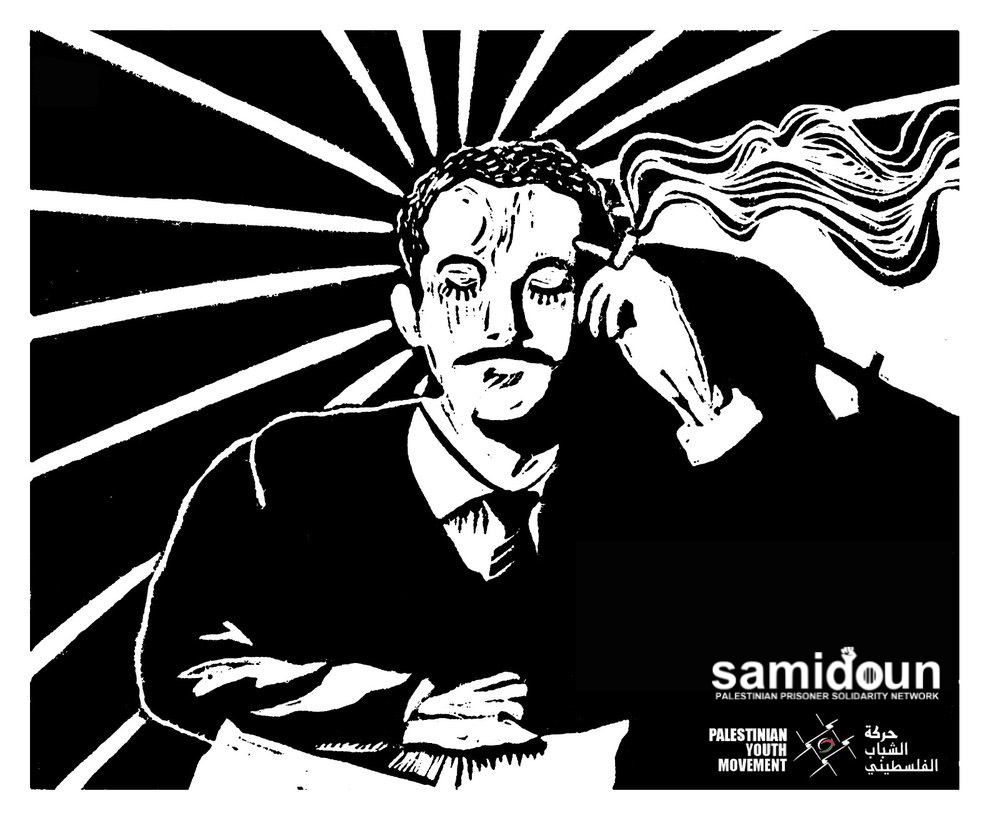
Ghassan Kanafani lives, Palestine lives
Kanafani’s cultural and political writings continue to educate, develop and inspire generations of Palestinians, Arabs and internationalists. Inside the occupation prisons, Palestinian prisoners read Kanafani’s works collectively as part of their self-education that turns the dungeons of the occupier into schools for revolution. And Palestinian young writers and artists continue to take inspiration from the life, legacy and writing of Kanafani, as expressed in the Palestinian Youth Movement’s Ghassan Kanafani Scholarship and Resistance Arts Anthology.
The attempt to liquidate Kanafani, his clarity of analysis, revolutionary politics and resistance literature, did not end with the Mossad bomb blast that took his life and that of his niece Lamees. We are currently witnessing an ongoing attempt by right-wing, Zionist, pro-apartheid organizations to silence academics who speak about Kanafani, to cancel events about or referring to Kanafani or to shut down readings or performances of his plays, novels and short stories. But the Zionist entity failed to snuff out Kanafani’s legacy, and its supporters will never cannot silence our righteous, commemorative acts of creative resistance. On the 50th anniversary of Ghassan Kanafani’s assassination, we are determined to make clear: Ghassan Kanafani lives on, through all of those who continue on his path of cultural resistance and committed struggle, until liberation and return, throughout all of Palestne.
Join us in organizing events and activities!
Events may include:
- Readings of Kanafani’s works, and group discussions of their current implications
- Conferences, discussions and presentations on Ghassan Kanafani’s ideas and legacy
- Events featuring the Ghassan Kanafani Resistance Arts Anthology
- Rallies, marches and demonstrations for Palestine that include a tribute to Kanafani
- Postering in your cities and neighbourhoods about Kanafani, his ideas, quotes and life
- Supporting the Ghassan Kanafani Cultural Foundation for Palestinian children
- … And more!
Contact us at samidoun@samidoun.net and palyouth.usa@gmail.com and tag us on social media to tell us about your events, invite a speaker to participate or request suggestions or resources!
Resources:
- Ghassan Kanafani Scholarship and Resistance Arts Anthology
- The 1936-1939 Revolt in Palestine – Ghassan Kanafani
- Ghassan Kanafani: Voice of Palestine (1936-1972)
- كنفاني… عن الطفولة والأدب والماركسية والجبهة والهدف
- وثيقة هامة من فكر غسان كنفاني: أفكار عن التغيير و”اللغة العمياء”
- Ghassan Kanafani and the era of revolutionary Palestinian media
- Kanafani’s interview with Richard Carleton
- Mondoweiss: Palestinian youth launch Ghassan Kanafani scholarship, call for submissions
Discover more from Samidoun: Palestinian Prisoner Solidarity Network
Subscribe to get the latest posts sent to your email.

